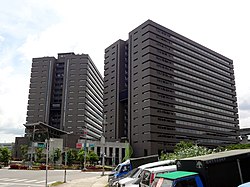Hakka Affairs Council
 From Wikipedia - Reading time: 6 min
From Wikipedia - Reading time: 6 min
| 客家委員會 Hak-kâ Vî-yèn-fi (Hakka) Kèjiā Wěiyuánhuì (Mandarin) | |
 | |
| Agency overview | |
|---|---|
| Formed | 14 June 2001 |
| Jurisdiction | Taiwan |
| Headquarters | Xinzhuang, New Taipei |
| Minister responsible |
|
| Parent agency | Executive Yuan |
| Website | hakka.gov.tw |
The Hakka Affairs Council (HAC; Chinese: 客家委員會; pinyin: Kèjiā Wěiyuánhuì; Pe̍h-ōe-jī: Kheh-ka Úi-oân-hōe, Pha̍k-fa-sṳ: Hak-kâ Vî-yèn-fi) is a cabinet-level unit under the Executive Yuan of the government of Taiwan.[1] Its mission is to revitalize Hakka language and culture, and promoting Hakka cultural research and exchange.
History
[edit]
The Hakka Affairs Council, officially established January 1, 2012, is a new agency resulting from the Executive Yuan’s structural reorganization. Its predecessor was the Council for Hakka Affairs, Executive Yuan, founded on June 14, 2001. The Council is the only central authority responsible for Hakka affairs in the world, and its mission is to revitalize Hakka language and culture, build a unifying Hakka identity promoting happiness, confidence and dignity, and become a global center for Hakka cultural research and exchange.
In order to catalyze the Hakka language revival and development, the Council re-structured two departments on January 18, 2021. The Department of Culture and Education is transformed into the Department of Language Development, undertaking the task of building Hakka language infrastructure and strengthening the ethnic language promotion. The Department of Communication and Marketing is re-organized as the Department of Art, Culture and Communication, dedicating to the development and marketing of Hakka cultural content industries.
Responsibilities
[edit]To promote ethnic mainstreaming and construct Hakka culture that can be shared by the public through cross-sector collaboration:
- To formulate Hakka policies and lay the foundation for the rule of law.
- To develop a Hakka language system and build a Hakka-friendly environment for local communities.
- To foster innovation of Hakka arts and share diverse cultures.
- To revitalize Hakka industries and rebuild community-based economy.
- To strengthen Hakka communication and enhance Hakka prestige.
- To cultivate Hakka citizens and enable them to connect global Hakka communities.
- To enrich Hakka cultural resources and find more opportunities for international exchanges.
List of ministers
[edit]Political Party: Democratic Progressive Party Kuomintang Non-partisan/ unknown
| No. | Name | Term of Office | Days | Political Party | Premier | |
|---|---|---|---|---|---|---|
| 1 | Fan Kuang-chun 范光群 |
14 June 2001 | 31 January 2002 | 231 | Democratic Progressive Party | Chang Chun-hsiung |
| 2 | Yeh Chu-lan 葉菊蘭 |
1 February 2002 | 19 May 2004 | 838 | Yu Shyi-kun | |
| 3 | Luo Wen-jia 羅文嘉 |
20 May 2004 | 14 March 2005 | 298 | Yu Shyi-kun Frank Hsieh | |
| — | Lee Yung-te 李永得 |
15 March 2005 | 19 June 2005 | 96 | Frank Hsieh | |
| 4 | Lee Yung-te 李永得 |
20 June 2005 | 19 May 2008 | 1064 | Frank Hsieh Su Tseng-chang Chang Chun-hsiung | |
| 5 | Huang Yu-cheng 黃玉振 |
20 May 2008 | 7 July 2014[2] | 2239 | Kuomintang | Liu Chao-shiuan Wu Den-yih Sean Chen Jiang Yi-huah |
| — | Liu Ching-chung 劉慶中 |
8 July 2014 | 4 August 2014 | 27 | Jiang Yi-huah | |
| 6 | Liu Ching-chung 劉慶中 |
5 August 2014 | 31 January 2016 | 544 | Jiang Yi-huah Mao Chi-kuo | |
| 7 | Chung Wan-mei 鍾萬梅 |
1 February 2016 | 19 May 2016 | 108 | Chang San-cheng | |
| (4) | Lee Yung-te 李永得 |
20 May 2016 | 19 May 2020 | 1460 | Democratic Progressive Party | Lin Chuan William Lai Su Tseng-chang |
| 8 | Yiong Con-ziin 楊長鎮 |
20 May 2020 | 20 May 2024 | 1461 | Su Tseng-chang Chen Chien-jen | |
| 9 | Ku Hsiu-fei 古秀妃 |
20 May 2024 | Incumbent | 446 | Cho Jung-tai | |
See also
[edit]References
[edit]- ^ "首頁 | 客家委員會全球資訊網".
- ^ Longest serving minister.
External links
[edit]- Hakka Affairs Council: Home Page
- 客家委員會Hakka Affairs Council - YouTube
- Hakka Culture Development Center-客家文化發展中心
- Japanese Artist’s Sketches of Hakka Impressions Hit Bookstores in Taiwan, Japan-Taiwan News
- Taiwan to host 1st World Hakka Expo next year-Taiwan News
- National Hakka project marks new milestone in Taiwan’s multiethnic society
- The Hakka Language Restoration Movement
 KSF
KSF